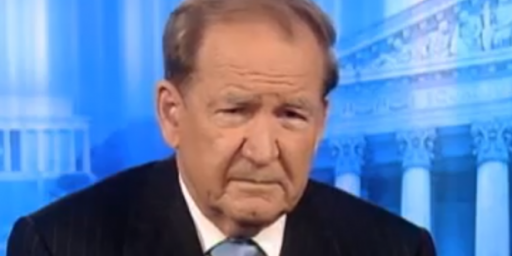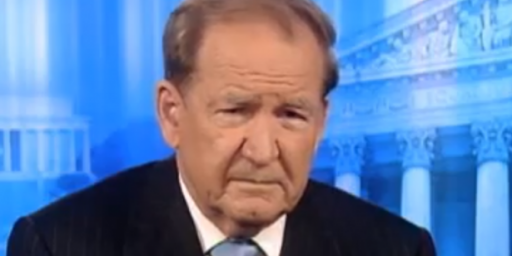Buchanan to Democrats: Cheer Up
Pat Buchanan has a message for Democrats, disconsolate over six straight national election defeats:
Suck it up. It is not all that bad. The Right spent years in deserts more barren than thee have ever known. When this writer went to work for Richard Nixon in 1965, Republicans had lost seven of nine presidential elections, held Congress for but four of the previous 35 years and had carried 38 percent of the presidential vote — in a two-man race. Goldwater had lost 44 states. A massacre had ensued on the Hill, with the GOP ranks reduced to 140 House seats and 38 senators. Nixon was a two-time loser who had, all assumed, committed hara-kiri in his 1962 “last press conference,” where he had rounded on the jackal pack that had bedeviled him since the Alger Hiss case. “Think of all the fun you’ll be missing,” Nixon railed. “You won’t have Dick Nixon to kick around anymore.”
In 1966, the dark night was suddenly over and the sun came out. The GOP picked up 47 House seats and six senators, and Nixon would go on to lead the party into an era where Republicans would win the presidency five times in six elections, capture both houses of Congress in 1994 and become America’s party.
Instead of bewailing their fate, Democrats should study how the Nixon-Reagan new majority displaced FDR’s New Deal coalition.
That strategy, mostly, required letting their own message sink in and exploiting the divisions within the Democrats. Buchanan thinks the Democrats could do the same, soon, if the Republicans don’t get their own house in order, especially if they can position themselves better on the social issues.
Coincidentally, Clarence Page discovers that Hillary Clinton has been following this advice for months.
[T]he conservative choir should be particularly irritated and nervous that Clinton, a Barry Goldwater-supporting libertarian conservative in her suburban Chicago youth, does not fit easily into the extreme-liberal box. Clinton’s recent speech in Albany, N.Y., to fellow abortion-rights advocates echoed the sensibly centrist vow of her husband, former President Bill Clinton, to make abortion “safe, legal and rare.” Then she went further. She courageously made a full moral-values appeal for something you seldom hear at pro-choice rallies: outreach to the anti-choice right. “We can all recognize that abortion in many ways represents a sad, even tragic choice to many, many women,” she said. “The fact is that the best way to reduce the number of abortions is to reduce the number of unwanted pregnancies in the first place.”
She praised faith-based programs. She reminded everyone that she is “a praying person” and that when she was first lady she advocated teenage celibacy. She defended family-planning services and over-the-counter sales of “Plan B” emergency contraception, but allowed that “the jury is still out” on a conservative favorite, abstinence-only programs for teens.
Sen. Clinton, in short, is triangulating, confounding her critics with the centrism that, like British Prime Minister Tony Blair’s “Third Way” ideology, helped Bill Clinton win two presidential terms here.
She has certainly made some shrewd moves that dovetail well with other suggestions in Buchanan’s piece. Whether this repositioning is enough to overcome her rather substantial baggage is another matter entirely.






What’s surprising about watching a Democrat like Clinton change her colors? We just got done watching Kerry do it for months…
Or watching GOP becoming the party of big government and unbridled deficit spending.
Loser –
What do you mean ‘becoming’? I believe Gus Hall said something like ‘They’ll all come to socialism but the Republicans will put up a little resistance first’
Six straight? Which six are you thinking of?
1994, 1996, 1998, 2000, 2002, and 2004. Six straight elections in which the Democrats, long the majority party, initially lost and then failed to win control of either House of Congress or the White House.
“Defeats” may have been too concise a formulation, I suppose, since the Democrats made gains in some of those elections. Still, the end result is Republican victory.
Technically, the Dems did partially win the Senate in 2000, then took control in 2001-02 after Jeffords’ defection. And if you look at it in terms of actual gains and losses, the GOP lost House seats in 1996 and 1998.
All this means is that the Dems are overdue for a new push back into power. Americans abhor a one-party system, and eventually the social/fiscal schism will break the GOP in half. Question is, will the turnaround start in 2008 or later? Because I’m thinking that the usual sixth year losses aren’t going to happen this time.
DW: The result of the 2000 election was a 50-50 Senate with a Republican tiebreaking Veep. Jeffords was among the Republicans elected. His disloyalty doesn’t bear on the point.